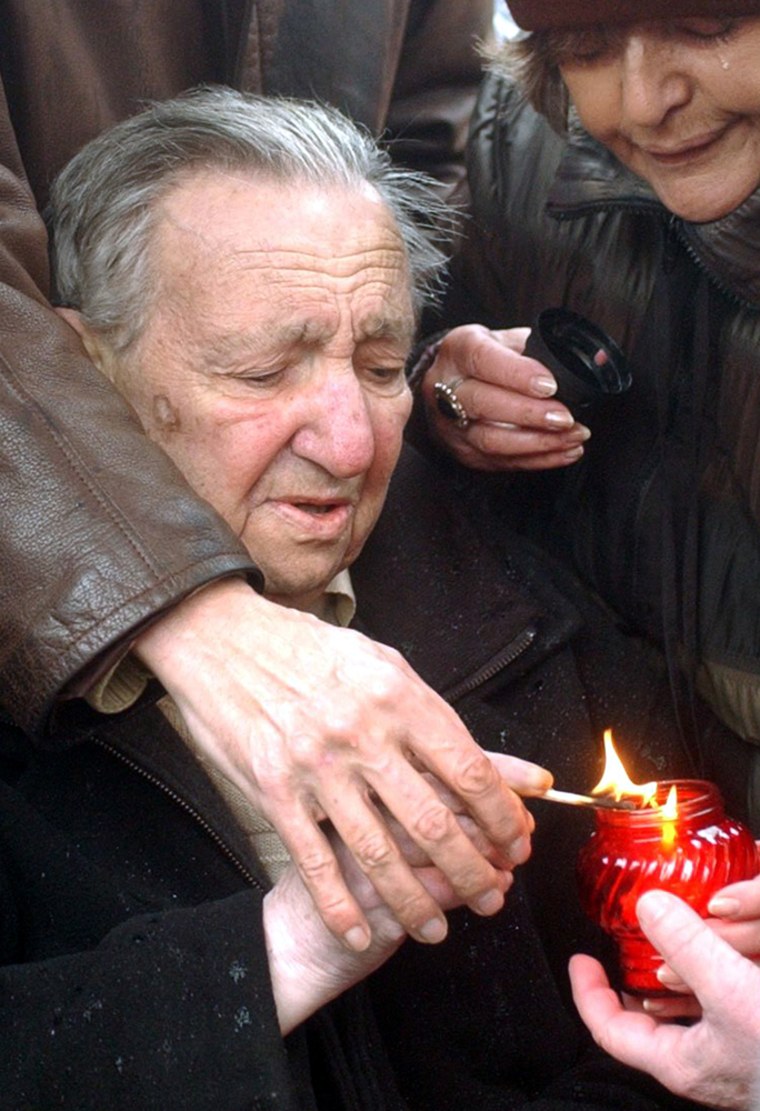The last surviving leader of the 1943 Warsaw ghetto uprising paid silent tribute Saturday to the heroes of the doomed revolt by young Jews against Nazi troops that started 65 years ago.
Marek Edelman, 89, handed yellow tulips and daffodils to his grandchildren, Liza and Tomek. He watched as they placed them at the foot of the gray and black Monument to the Heroes of the Ghetto — located in a barren square at the heart of the former ghetto.
Accompanied by a crowd of a few hundred people in wet weather, Edelman, in a wheelchair, moved on to nearby monuments to leaders of the ghetto revolt, before ending in a square where the Nazis put more than 300,000 Jews on trains to Auschwitz and other death camps.
At a separate ceremony, members of the Jewish community read out the names of some of those killed in the uprising and then formed a human chain in front of the ghetto heroes' monument, as sirens wailed and military guards fired three rounds of gunfire as a sign of mourning.
The uprising was the first act of large-scale armed civilian resistance against the Germans in occupied Poland during World War II.
The Nazis walled off the ghetto in November 1940, cramming 400,000 Jews from across Poland into a swath of the capital in inhuman conditions.
Liquidating the ghetto
On April 19, 1943, German troops started to liquidate the ghetto by sending tens of thousands of its residents to death camps. In the face of imminent death, several hundred young Jews took up arms in defense of the civilians.
Outnumbered and outgunned, they held off German troops for three weeks with homemade explosives and a cache of smuggled weapons. The uprising ended when its main leaders —rounded up by the Nazis — committed suicide on May 8, 1943. The Nazis then razed the ghetto, street by street.
Edelman recalled in a recent interview with The Associated Press that the Nazis "wanted to destroy the people, and we fought to protect the people in the ghetto, to extend their life by a day or two or five."
"I remember them all — boys and girls — 220 altogether, not too many to remember their faces, their names," he said of the young fighters.
A small, yet mighty resistance
They scraped together guns and ammunition that they and Polish resistance managed to smuggle in, and adopted hit-and-run tactics.
"Every moment was difficult. It was two or three or 10 boys fighting with an army," Edelman said. "There were no easy moments."
Saturday's commemorations followed official events that were held on Tuesday, to avoid coinciding with the Jewish sabbath.
Poland's President Lech Kaczynski and Israeli President Shimon Peres led those observances, in which the Jewish prayer for the dead echoed across the former ghetto.
